Love Bombing
You may read that Godot’s development is driven by passion and out of love for those who make games. Participating in an community such as Godot grants a feeling of belonging. Yet this “love” and attention is exactly what describes a cult as well.
Those who find themselves in the presence of cultic groups often perceive only what the leaders intend for them to see. This is achieved through the manipulation of propagandist techniques, such as employing “The Big Lie”1. This strategic approach ensures that individuals remain unsuspecting and don’t anticipate the deception that is taking place.

The reason why anyone can be roped into a cult is because humans as a species are social and we all have a powerful desire to belong to a group. It can be our greatest strength and greatest weakness, and in the case of cults, it gets taken advantage of.
You’ll read phrases like “preaching gospel of Godot” from those who donated to Godot financially2. Godot followers repeat lead developer’s propaganda delivered via articles such as “As an Open Source project, Godot is more than a game engine”3, so they feel obligated to spread the word about Godot, which is one of the reasons that makes Godot ideology viral.
There are various nuances and subtleties that might not be immediately evident. Let’s take a deeper dive into the so-called “love” displayed by Juan and the Godot community.
Kindness and Coercion
Let’s take a closer look at the key messages from Godot’s cult leader which eloquently demonstrates this love bombing technique, emphasis mine:
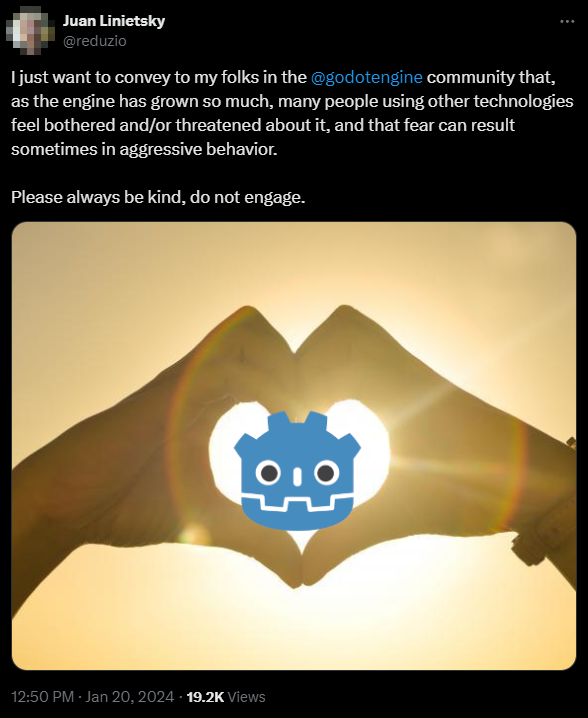
I just want to convey to my folks in the @godotengine community that, as the engine has grown so much, many people using other technologies feel bothered and/or threatened about it, and that fear can result sometimes in aggressive behavior.
Please always be kind, do not engage.
Analyzing Juan’s message reveals the following:
-
In-Group Language: The use and combination of “my folks” and “Godot community” creates a sense of belonging and unity among waiters for Godot. This reinforces an environment where people within Godot feel a special connection to Juan.
-
Big Lie of Growth and Power: By stating that “the engine has grown so much,” Juan is implying that the community or ideology is becoming increasingly influential or powerful. This can instill a sense of pride in the followers and reinforce their commitment to Godot and keep waiting for its so-called “inevitable” success.
-
Creating an External Threat: Juan introduces an unreal threat by suggesting that people using other technologies feel threatened by the purported success of Godot. This reinforces the us-versus-them mentality, making followers to be wary of outsiders. This framing sets up an external threat, making it appear as though Godot’s purported success is causing discomfort or fear in outsiders. This portrayal creates a sense of vulnerability among followers, reinforcing the idea that they need protection and solidarity within the community.
-
Fear Manipulation: Juan suggests that this fear can lead to aggressive behavior. This is an attempt to control the narrative and discourage followers from questioning or criticizing Godot’s beliefs or practices. Waiters for Godot unconsciously link any criticism with aggression, believing they should steer clear of it to gain acceptance in Godot.
-
Directive for Followers: The instruction to “always be kind” is a subtle coercion tactic. It positions Juan as a moral authority. The directive to “not engage” is an attempt to isolate the followers from external influences and differing perspectives. By following these directives, waiters for Godot come to believe that they can “shield” themselves from a threat that is, in fact, purely imaginary.
Cult members often become highly dependent on their leaders for emotional and psychological validation. In Godot, this dependency is largely developed through love bombing, which initially overwhelms members with affection and approval, creating a powerful bond. In the IT age, one way to do this is through the use of memes. This example shows how people seek approval and validation. A Godot user asks their leaders if they are proud of them:
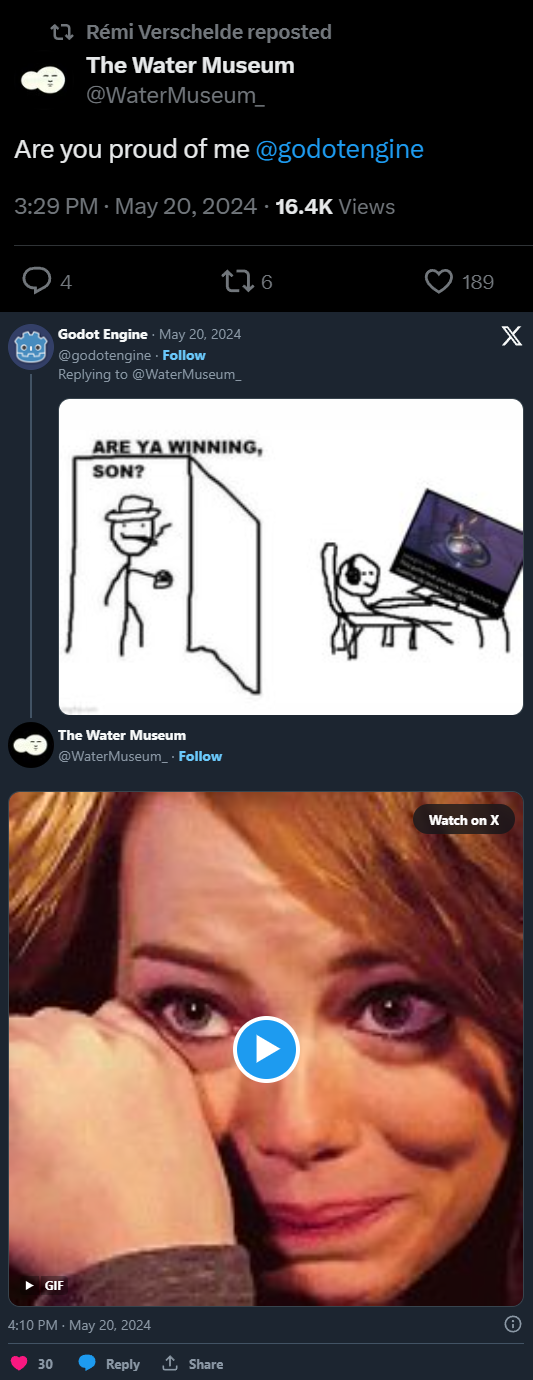
This is not the only example of such behavior. To outsiders of this cult, this may be interpreted as a joke, but such behavior has its psychological explanation. To some extent, they may also treat it as a semi-joke, but often the purpose of jokes is to communicate things that may not be socially acceptable, such as worship:
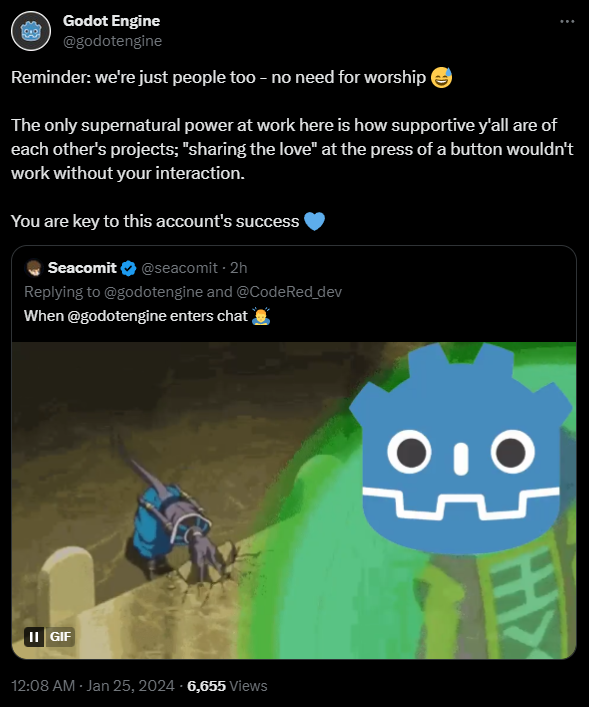
Godot “asks” people not to worship them, while at the same time claiming to have “supernatural” powers. What Godot does is an attempt to downplay any perceived authority and to hide Godot’s hierarchical structure. They always “joke” about these things. The added 💙 emoji further diminishes the seriousness of the issue and discourages its critical examination, such as this one.
Despite the downplaying of worship, they still cannot give up the idea that they possess “supernatural” qualities, which is inconsistent with the request not to worship them. They cannot deny that they have any superiority, since Godot’s existence depends on these grandiose claims.
The phrase “sharing the love” is again a classic example of love bombing. Encouraging mutual support and presenting the community as the key to Godot’s success is a typical cult strategy designed to cultivate a sense of belonging.
This builds loyalty and thus strengthens people’s devotion to Godot in exchange for the feeling of being part of something. So those waiting for Godot end up inadvertently serving the leaders’ personal agenda, and something like a pat on the back gets the job done.
Playfulness and Safety
Cults often make their environment look and feel safe, welcoming, and even childlike. Take Godot’s logo, for example. Many people describe it as playful or even childish, so you’ll often see numerous Godot proposals to change Godot’s icon4, all of which are rejected by Godot’s leadership.
Yes or no: Godot's current logo has GOT to go. pic.twitter.com/GE5iqQrDad
— Thomas Brush (@thomasbrushdev) November 9, 2023
Of course, Godot founders are free to have whatever icon they want to represent Godot, and this child-like look is not a bad thing in and of itself. But let’s see what the leader of Blue Robot Cult has to say about it5:
In all seriousness, the current Godot logo was created to convey a friendly, welcoming and informal feeling, which is what the engine represents at heart..
Our goal is to make the best engine you will ever use (having lots of fun along the way) and make sure it’s as accessible as possible for everyone. We are not here to sell a professional product or make money from you.
So, I hope you can accept and enjoy Godot for what it is.
Oftentimes, cults out there attempt to revert people back to childhood dependence and mindless obedience, so they even encourage this sort of playfulness. As expected, Juan appeals to emotions here, just like all cult leaders do.
Note that when Juan says it’s their goal to “make the best engine you will ever use” is not necessarily a lie. Why? Because you likely won’t experience other engines, stuck with Godot and feel closely attached to it, as some users describe it6, especially if you’ve never really used other game engines before. Ironically, this condition is jokingly called “Godotitis”7:
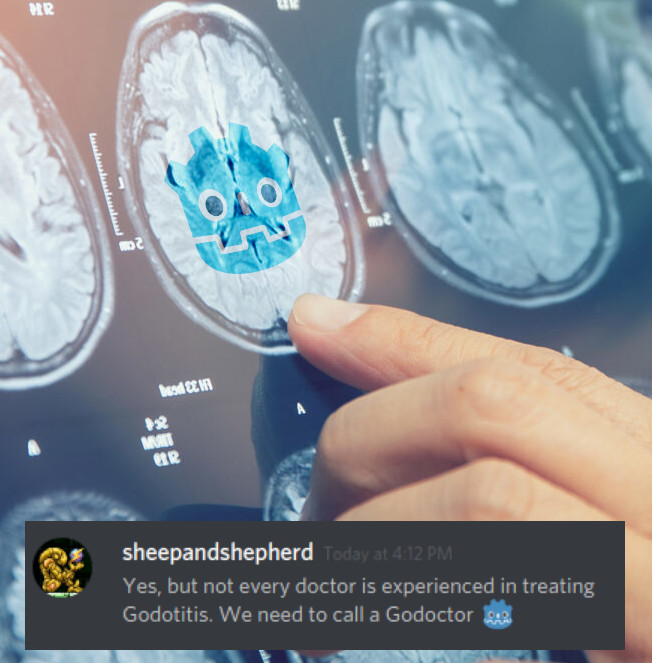
This condition may become so severe that Godot’s project manager sacrifices vacation time. Other members may spend an inordinate amount of time contributing to Godot’s development and maintenance8. But this is not all, of course! Because of the atmosphere created by the cult subleaders, the community has even created a character named Godette:

Godot’s leadership attempted to mock the criticism that the engine has received, such as claims that it is not professional enough. To this end, they even created a Twitter account9 and wrote an article for April Fool’s Day10.
It is the dawn of a new era in game development. Godot has been rebranded to Godette Engine:https://t.co/jtcGBjmuYC
— Godette Engine (@godetteengine) March 31, 2021
However, this attempt at “humor” was poorly received by some groups. Here is what Godot’s leadership wrote in response:
Edit: We have seen many comments on our April Fool’s joke. We strive to make the Godot community, and game development in general, a welcoming place for everyone. By not understanding the various ways in which our joke could be interpreted we have failed in this goal.
The Godette character was made years ago. It was not created for this joke. The joke itself was intended to poke fun at a very vocal minority of users [emphasis added] who think that our robot logo isn’t “professional”, thus the joke was us pretending to be switching to an even more playful character.
Having said that: our intention does not matter if so many people interpreted the article in the way they did. We apologize for the oversight. We strive to do better in the future.
Also note how they describe those people as “a very vocal minority of users,” which is not accurate if you look at a poll created by the Godot community on this matter11.
Should Godot get a more professional logo?
byu/ElliotBakr ingodot
Rémi often refers to people as a “vocal minority” when they disagree with Godot’s decisions in order to mitigate the criticism that Godot receives, especially from people outside of the Godot community. If anything, it’s actually a case of psychological projection by Godot’s leadership. This is because Godot represents a vocal minority within the game development industry as a whole.
Love Equals Money
The cult leader of Godot is very outspoken when it comes to money as well:
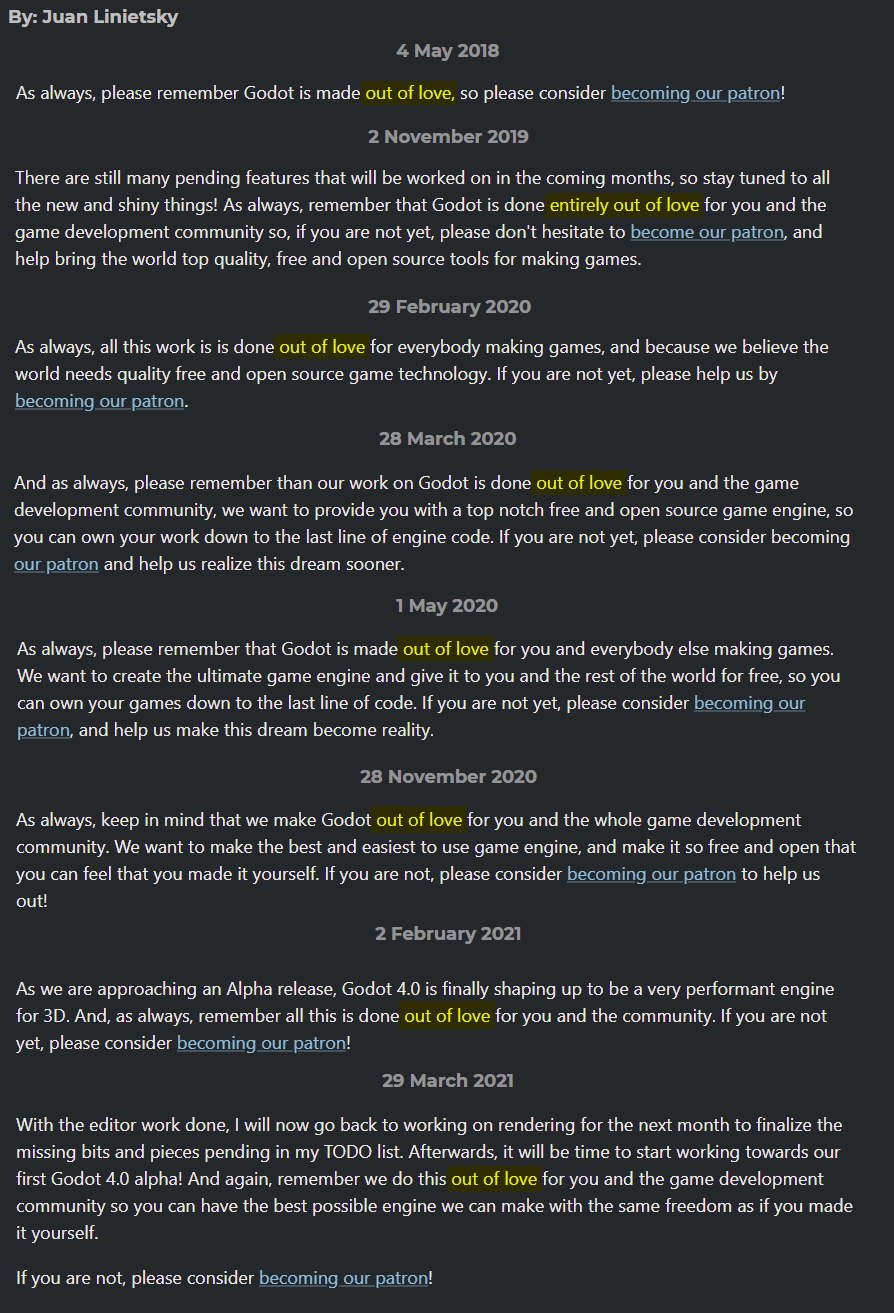
Why not just develop Godot Engine independently, then? Why receive donations? What, having passion is no longer enough for Godot to thrive? Sure, Godot cult leaders don’t want to make money from you. 🙃
Of course, this is not to say that a project cannot receive funds. The core issue is Godot’s hypocrisy: when they say that they can sustain themselves without depending on money at all by having “thousands of contributors,” but at the same time, constantly ask you to donate and having for-profit companies co-founded specifically on the popularity of volunteer-developed Godot12:
So, if you care about the future of Godot, and believe in a future with true freedom of game development tools, please be attentive to it and lend us your support when the time comes! Godot is 100% a product of love [emphasis added], so let’s make this mutual!
So... you spent the $8.5 million dollars already? https://t.co/6yDWxjjDv3
— Andres Hernandez (@cybereality) July 12, 2023
This love bombing technique is typical to corporate cults13, when “love” is immediately followed by “money”, along with other factors that we’re going to cover in subsequent chapters, where this so-called “love” alternates with intimidation when Godot receives criticism concerning its governance.
The following meme by the cult leader of Godot, Juan Linietsky, is a “TL;DR” of this section (context: Godot planned exhibiting at GDC, close to Unity and Unreal booths)14:
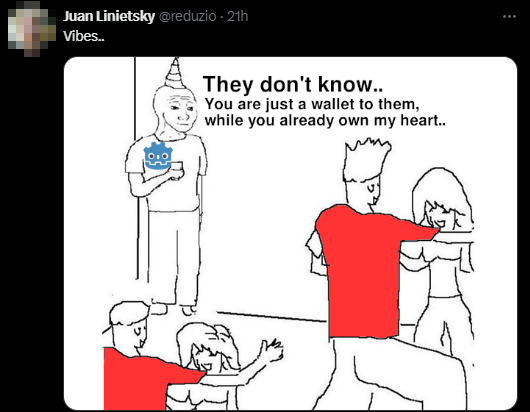
The heart is on the other side, Juan! 😁
Celebrities
In true cult fashion, Godot leverages celebrity endorsements to bloat its supposed trustworthiness. A standout example is the recruitment of Brackeys, a popular Unity video tutorial creator, whose association with Godot has unfortunately bolstered its standing in the indie gamedev community.
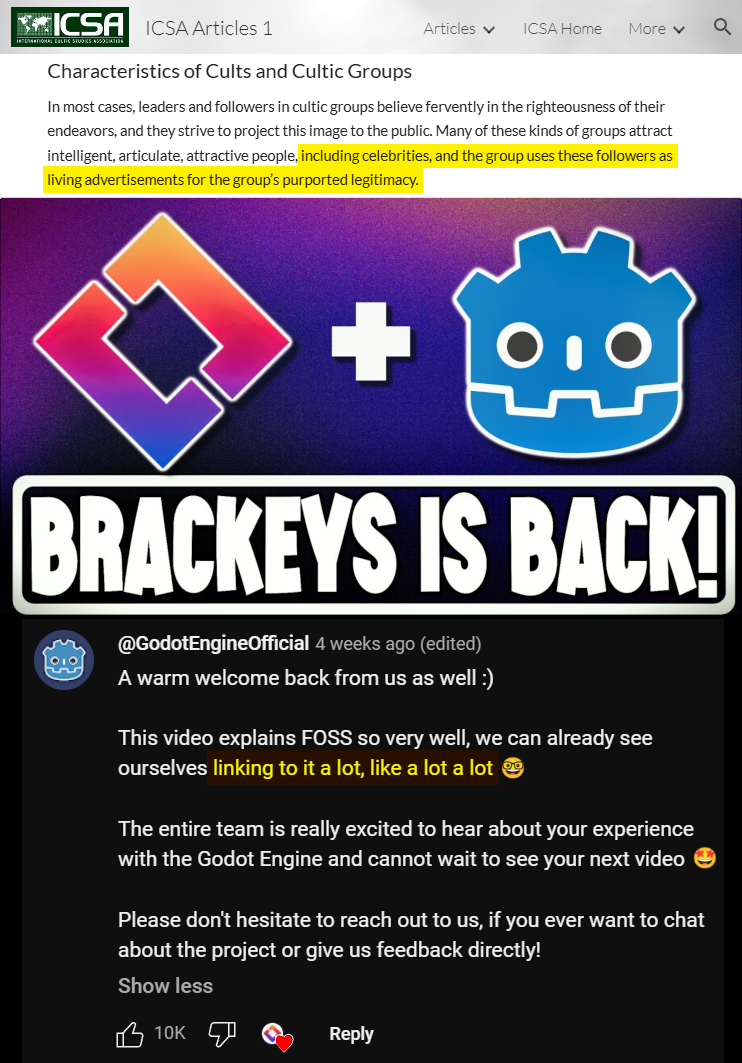
According to International Cultic Studies Association15:
In most cases, leaders and followers in cultic groups believe fervently in the righteousness of their endeavors, and they strive to project this image to the public. Many of these kinds of groups attract intelligent, articulate, attractive people, including celebrities, and the group uses these followers as living advertisements for the group’s purported legitimacy. [emphasis added]
In response to Brackeys’ comeback after a long absence, Godot welcomed him “back” and said they’d link to his videos “a lot a lot”16:
A warm welcome back from us as well :)
This video explains FOSS so very well, we can already see ourselves linking to it a lot, like a lot a lot [emphasis added] 🤓
The entire team is really excited to hear about your experience with the Godot Engine and cannot wait to see your next video 🤩
Please don’t hesitate to reach out to us, if you ever want to chat about the project or give us feedback directly!
It’s evident that Godot is fixating on creating a buzz than on improving their product. They go to great lengths to attract influencers like Brackeys, using these endorsements to mask their shortcomings. While leveraging a celebrity’s endorsement is a normal thing to do, Godot is obsessed with the idea of being noticed by famous figures rather than delivering a quality product.
In the topic titled “Brackeys is back… kind of” on the Unity forum, people have shared mixed feelings about Brackeys’ new focus on Godot. Here’s a subset of what they said17:
While a tiny part of me is sad he’s making videos about Godot, I’m so glad to see him back. I guess I will learn Godot because I love watching his videos, even if I then never use it.
I will never understand why people liked his videos.
His content had a significant impact, attracting a stream of new users to Unity. He will most likely have a similar impact on the Godot community, offering a clearly defined pathway from Unity.
He found a new engine to use and will start a video series on it. Kudos to him, ive tried Godot a few times and even though its open-source doesnt mean its good. Its not… (my opinion).
He is not a good game dev. He is a good beginner tutorial factory. His tutorials and examples are riddled with inefficiencies, anti-patterns and problems will bite your *ss later, when he is gone and you’re on your own with your problem.
Such a kind and lovely chap; learnt so much from his Unity tutorials over the years! Can’t wait to watch his next phase!
Check out this satirical piece on the matter. It poses the ironic question of whether Brackeys is truly back, given that he worked with Unity for years:
Reportedly, it seems that a lot people enjoy watching Brackeys’ videos about Unity purely for entertainment, if not for learning purposes. For more information in the context of Unity, read investigation article Waiting and Unionizing for Blue Robot: Are Godot advocates infiltrating Unity?
The Godot fanbase certainly knows how to keep themselves busy—promoting Godot to the moon and back by associating it with celebrities, popular brands, and just about anything else you can think of. Of course, actually making games seems to be a bit too mainstream for them. A prime example of their creative efforts is the recent buzz around Keanu Reeves, who’s set to star in a new Broadway production of Samuel Beckett’s “Waiting for Godot.” Predictably, fans couldn’t resist making a playful connection between him and their beloved engine, despite the obvious lack of any real connection:
I fixed the headline. :) pic.twitter.com/4Wpgq0kdfx
— MX Cartoons (@MXCartoons) August 1, 2024
Singing
“They all start singing, running around, hugging each other, and praising the Lord,” as one cult story tells18. Which is pretty typical to cults of all kinds, to be honest!
The following video is a testament that Godot is no exception. Consider this as an innocent extra bonus to all we’ve described so far, for good laughter!
Perhaps we will witness a Commune of Blue Robot at some point. 🤣
Notice how even this music video is really just an adaptation of the original one. In general, it is interesting to observe how Godot followers constantly make connections with popular culture, in an attempt to promote Godot in some way, make stronger connections between community members, and most importantly, attract new followers.
Conclusion
Godot is highly focused on recruiting new members and raising funds through love bombing. It’s no wonder, since Godot is offered for free, and the entire community operates under the undue influence of Godot’s leadership. Members feel an abnormal sense of obligation to promote Godot. While Godot is technically free, the hidden cost lies in its nature as a cultic group.
It is highly likely that individuals who join Godot are seeking external validation, longing for the feeling of “love” or the less apparent sense of “coziness” that comes from returning to a family-like community after a challenging day at work. This community welcomes them unconditionally, as long as they never criticize leadership and their community, of course.
Frankly, Godot operates in a similar way scams do. When you are deep in a scam, you don’t want to feel scammed, you don’t want to admit that you got scammed, so you tend to get scammed further in the process of not admitting that you got scammed! Many followers simply don’t realize that they are trading unpaid endorsement of Godot for a superficial sense of “love” and the need for it cannot be fulfilled this way.
If you are a follower of Godot reading this, it’s important to understand that you don’t truly “love” Godot. Instead, you are drawn to the community associated with Godot, or more accurately, the narcissistic facade of it. It appears as a welcoming community that you desire to be a part of. However, the truth is that we can already experience these feelings by looking within ourselves, as they are inherent to our human nature. There is no need to rely on the approval of a community to feel good about yourself.
References
The Big Lie - Changing Minds.
Godot: Why Open Source is Important - By “The Omniblog”.
As an Open Source project, Godot is more than a game engine - By Juan Linietsky.
New Logo proposal for the Godot Engine 4 !!! - Godot proposals, GitHub.
Juan Linietsky on Godot logo - Twitter.
Akien was supposed to be on vacations - Godot, GitHub.
Calinou doesn’t sleep - Godot, GitHub.
Godette Engine - Twitter.
Godot has been renamed to Godette Engine - By Juan Linietsky.
Should Godot get a more professional logo? - Godot, Reddit.
Am I Working for a Cult? 5 Signs You Are Working in a Corporate Cult and 7 Tips to Avoid Joining One - Damon Baker, Founder & CEO at Lean Focus.
Juan Linietsky GDC vibes - Twitter.
Characteristics of Cults and Cultic Groups - By International Cultic Studies Association.
The Future of Game Development - Comment by Godot Engine official YouTube Channel.
Brackeys is back… kind of - Unity forum.
Wild Geese - Wild Geese, ICSA Today, Vol. 9, No. 1, 2018, 11-13.